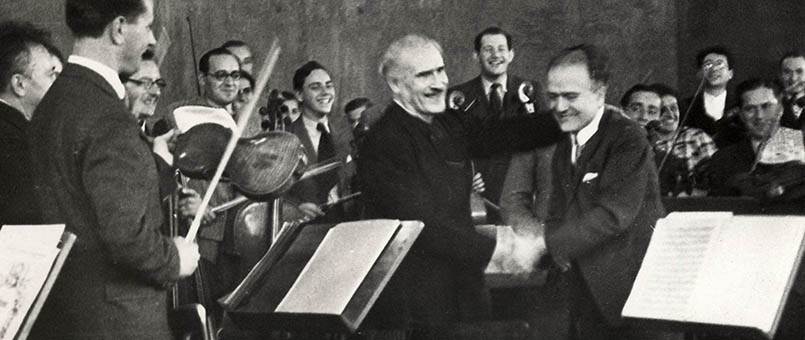
Top 5 composers of the 20th Century
2017 and 2018 sees anniversaries from some of the greats in 20th century classical music, with the centenary of Debussy’s death and the 150th anniversary of Arturo Toscanini’s birth. With these important anniversaries approaching, why not take a look at our profiles of five of the most influential composers and conductors of the 20th century.
Claude Debussy (22 August 1862 – 25 March 1918)
French composer, considered one of the greatest composers of the 20th century.
Anniversaries
2017: 155 years since birth
2018: 100 years since death
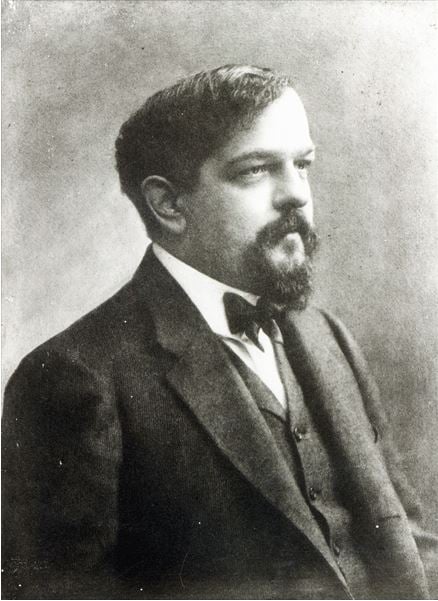
Claude Debussy, c.1908 (b/w photo), Nadar, (Gaspard Felix Tournachon) (1820-1910) / Private Collection
“Music is the space between the notes.” – Claude Debussy
Often deemed a leading figure in French music and the founder of musical impressionism, he is known for his uniquely structured compositions, non-traditional scales and tonal structures.
Talented from a young age, Debussy was just 11 when he went to the Paris Conservatoire. Here, he began experimenting from the outset, sometimes to the dismay of his peers and teachers.
Debussy’s inspirations were varied from Russian composers, Javanese gamelan to Richard Wagner. Aged 22, he won the esteemed Prix de Rome competition with his cantata L’Enfant prodigue.
Whilst some loved it and others hated it, Debussy gained worldwide recognition when his seminal opera Pelléas et Mélisande was performed in 1902. Three years later, Debussy’s Suite bergamasque was published. This comprised of four parts – Prélude, Menuet, Clair de lune and Passepied.
In his later years, Debussy continued to compose and perform his works around the world as well as writing as a critic.
Arturo Toscanini (25 March 1867 – 16 January 1957)
Italian conductor, considered as one of the greatest of the 20th century.
Anniversaries
2017: 150 years since birth
2017: 60 years since death
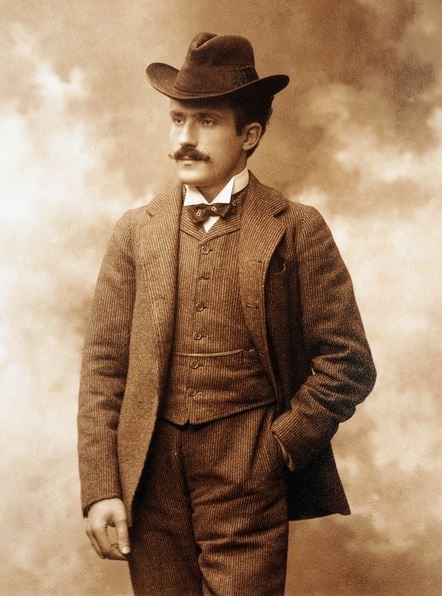
Arturo Toscanini (Parma, 1867 – New York, 1957), Italian conductor / De Agostini Picture Library / A. Dagli Orti
“God tells me how the music should sound, but you stand in the way.” – Arturo Toscanini
Like Debussy, Toscanini demonstrated his talents from a young age. Aged nine, he entered Parma’s Royal School of Music and by 17, he was already conducting his own compositions. He graduated with the highest honours in composition and cello.
His career in conducting began as something of an accident. Aged 19, when touring as a cellist for an opera company, he filled in as the conductor one night. After much acclaim, he decided to serve as conductor for the rest of the season.
Throughout his career, Toscanini worked with leading opera houses and symphonies worldwide, from La Scala to the Metropolitan Opera. He conducted the world premieres of Ruggero Leoncavallo’s Pagliacci, Richard Wagner’s Die Götterdämmerung and Giacomo Puccini’s La Bohème.
Disapproving of the growing Fascism throughout Europe, Toscanini was active in his condemnation. In 1931, he was attacked for refusing to play the Italian fascist anthem and five years later, he travelled to Palestine to conduct a group of Jewish musicians who had fled Europe because of growing tensions.
Maurice Ravel (7 March 1875 – 28 December 1937)
French composer known for works such as Boléro and Daphnis et Chloé.
Anniversaries
2017: 80 years since death
2025: 150 years since birth
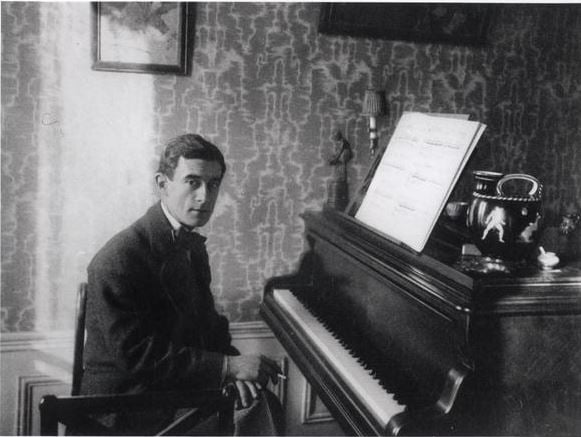
Maurice Ravel (1875-1937) (b/w photo), French Photographer, (20th century) / Private Collection / Archives Charmet
“The only love affair I have ever had was with music.” – Maurice Ravel
Ravel‘s legacy is that of one of France’s most popular and complex composers. He was considered anti-Wagnerian, Impressionist and Neo-classicist.
Aged 14, Ravel showed potential and was admitted to the Paris Conservatoire. Throughout his time there, he composed many successful works including Pavane pour une infante défunte, and Jeux d’eau.
Referred to as “the most perfect of Swiss clockmakers” by Igor Stravinsky, Ravel was admired by many. His Basque heritage often shaped his works; he produced many Spanish-influenced pieces.
At the height of his success, the First World War broke out, meaning a number of his projects did not materialise. Whilst he did get close to his former glory after the war, the remainder of his life was affected by Pick’s disease, neurological disorder that impacts speech and motor impulses.
Igor Stravinsky (17 June 1882 – 6 April 1971)
Russian composer known for controversial works such as ‘The Rite of Spring‘
Anniversaries
2017: 135 years since birth
2021: 50 years since death
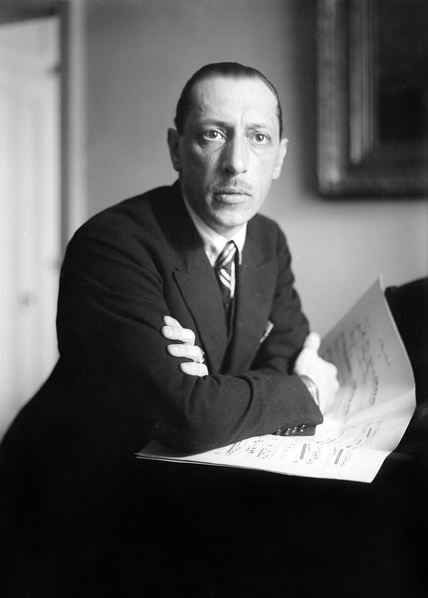
Igor Stravinsky / Photo © PVDE
“The more constraints one imposes, the more one frees one’s self. And the arbitrariness of the constraint serves only to obtain precision of execution.” – Igor Stravinsky
Not the conventional route into composing, Stravinsky was studying Law when he became friends with Vladimir Rimsky-Korsakov, the son of Nikolai Rimsky-Korsakov, a successful composer, and member of The Five. Rimsky-Korsakov mentored the budding composer and used his influence to get Stravinsky’s works performed.
His big break came after Serge Diaghilev, having been impressed by Stravinsky’s work, commissioned some orchestral arrangements for his Ballets Russes. This eventually led to the commissioning of The Fire Bird which turned Stravinsky into a big success.
He gained notoriety for the controversial The Rite of Spring, which incited a riot when it had its premiere.
After moving to the United States in 1939, Stravinsky lectured at Harvard University and also completed one of his most important works, Symphony in C. Ever causing controversy, Stravinsky was nearly arrested in 1944 after rearranging the American national anthem for a performance in Boston.
Gustav Mahler (7 July 1860 – 18 May 1911)
An Austrian composer and conductor known for his emotional yet subtly orchestrated symphonies.
Anniversaries
2020: 160 years since birth
2021: 110 years since death
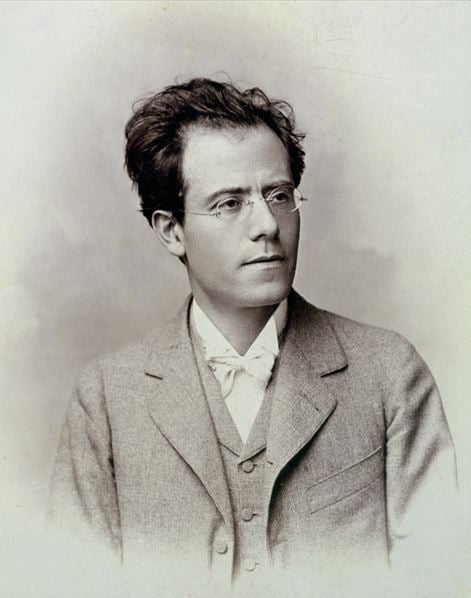
Portrait photograph of Gustav Mahler / Private Collection
“All that is not perfect down to the smallest detail is doomed to perish.” – Gustav Mahler
Whilst a great deal of his career was during the 19th century, Mahler features in our top five as he was a pioneer of 20th century composition techniques.
Mahler began singing and composing on the accordion aged just four and went on to enter the Vienna Conservatoire at 15. Despite composing at school, he opted for a career in conducting after he graduated.
He served as the musical director for the Vienna Court Opera and led the New York Metropolitan Opera and Philharmonic Orchestra. In 1902, he married fellow composer and musician Alma Maria Schindler.
Mahler’s compositions were symphonic rather than operatic. He composed 10 emotionally-charged symphonies in his career. His work is characteristic of the Romanticism movement.
Decades after his death, Mahler’s work became highly regarded for its progressive tonality, having influenced composers Arnold Schoenberg and Benjamin Britten.
